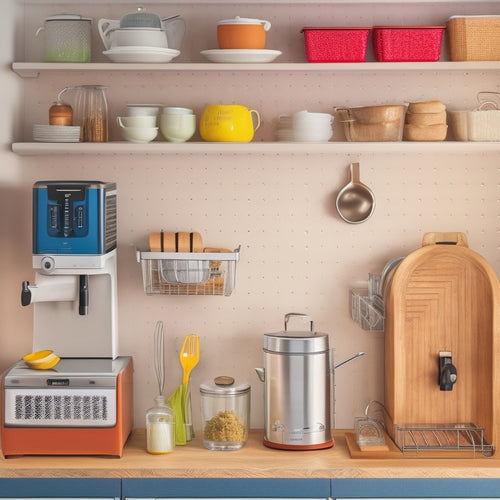
Unlocking the Secrets: Decluttering Vs. Organizing
Share
Decluttering and organizing are two distinct processes that serve different purposes. Decluttering is about reducing unwanted items, resulting in reduced stress and increased productivity. It involves acknowledging the primary objective, utilizing downsizing tips, and developing strategies to overcome emotional attachment. Organizing, on the other hand, focuses on creating systems to maintain what remains, building functional storage solutions, and implementing labeling techniques. By prioritizing function over form and overcoming common obstacles, individuals can achieve a sustainable system that maintains order and reduces waste. To fully realize the potential of these processes, understanding the nuances of each and how they work together in harmony is crucial.
Key Takeaways
• Decluttering involves removing unnecessary items, while organizing focuses on structuring and maintaining what's left in a functional and efficient way.
• A key difference between decluttering and organizing is that decluttering is a one-time task, whereas organizing is an ongoing process that requires maintenance.
• Decluttering helps reduce stress and increase productivity by removing distractions, while organizing helps create a sense of order and control.
• Effective decluttering sets the stage for successful organizing by providing a clean slate for implementing functional storage systems and habits.
• Understanding the difference between decluttering and organizing is crucial to creating a sustainable and functional system that promotes long-term productivity and well-being.
The Decluttering Process
When starting the decluttering process, it is vital to acknowledge that getting rid of unnecessary, unused, and unloved items is the primary objective, as this lays the foundation for a more organized and functional living or work space.
By letting go of these items, individuals can reap numerous decluttering benefits, including reduced stress, increased productivity, and improved focus. Downsizing tips, such as starting small and being intentional with each item, can aid in this process.
However, emotional attachment often hinders progress, making it essential to develop strategies for letting go. By recognizing the emotional attachment and adopting a mindset of release, individuals can overcome this hurdle and access the full potential of decluttering.
Organizing Essentials
A well-organized space is built on the foundation of a functional storage system, where each container serves a distinct purpose and is tailored to the specific needs of the items it holds.
Effective storage solutions are essential in maximizing space and reducing clutter. Implementing labeling techniques, such as categorizing and color-coding, helps maintain a sense of order and makes it easier to locate items.
Additionally, establishing maintenance tips, like regular tidying and inventory checks, guarantees the system remains sustainable and efficient.
Function Over Form
In order to create a truly effective storage system, it is important to prioritize function over form, recognizing that the primary purpose of storage containers is to serve a specific need rather than solely to add aesthetic appeal. This means embracing simplicity first and remembering that functionality matters.
When selecting storage containers, consider the following key factors:
- The container's purpose and how it will be used
- The size and shape of the items to be stored
- The frequency of access and retrieval
- The durability and quality of the container
- The ease of labeling and identification
Overcoming Organizing Obstacles
Effective organization often encounters roadblocks, and recognizing these hindrances is essential to devising strategies for overcoming them and achieving a truly functional and sustainable system. Time management is a common obstacle, as individuals may struggle to allocate sufficient time for organizing tasks. To overcome this, prioritize tasks, set realistic goals, and establish a schedule to ensure consistent progress.
Another obstacle is decision making skills, as individuals may struggle to decide what to keep, donate, or discard. To overcome this, establish clear criteria for decision making, such as considering the item's functionality, frequency of use, and sentimental value.
Sustainable Systems
By establishing a well-organized space, individuals can shift their focus towards maintaining a sustainable system that promotes long-term functionality and minimizes clutter accumulation.
A sustainable system is built on creating routines that maintain the space organized and clutter-free. This can be achieved by:
- Implementing eco-friendly solutions, such as repurposing or recycling materials, to reduce waste and minimize environmental impact.
- Designating specific areas for specific tasks to uphold a sense of order and structure.
- Establishing a regular maintenance schedule to prevent clutter buildup.
- Using multi-functional storage solutions to maximize space and reduce clutter.
- Incorporating habits, such as the 'one in, one out' rule, to keep a balanced level of possessions.
Frequently Asked Questions
How Often Should I Declutter My Living Space to Maintain Organization?
To maintain organization, consider regular decluttering sessions every 3-6 months, depending on your lifestyle and accumulation rate, to reap benefits such as reduced stress, increased productivity, and effective maintenance of your newly organized space.
Can I Organize My Space Without Getting Rid of Clutter First?
To effectively organize your space, it's essential to declutter first, as accumulated clutter can hinder organization methods and negate the benefits of minimalism.
What Are Some Creative Ways to Repurpose Old Storage Containers?
"Think outside the box" and breathe new life into old storage containers with upcycling ideas, such as transforming them into planters, candle holders, or desk organizers, offering creative storage solutions through DIY projects and hacks.
Are Professional Organizers Worth the Investment for Extreme Clutter?
For individuals overwhelmed by extreme clutter, investing in a professional organizer can be invaluable, as they facilitate clutter transformation and provide customized clutter management strategies, ultimately yielding a more organized, sustainable, and peaceful living or work space.
Can Decluttering and Organizing Really Reduce Stress and Anxiety?
As the ancient Greek philosopher, Epicurus, once said, "The greatest wealth is to live content with little." Indeed, mindful decluttering and embracing minimalism can have a profound impact on mental health, fostering a sense of inner peace and reducing stress and anxiety.
Related Posts
-

Smart Storage for Small Kitchen Appliances
You can optimize your small kitchen's functionality by implementing smart storage solutions that efficiently stash sm...
